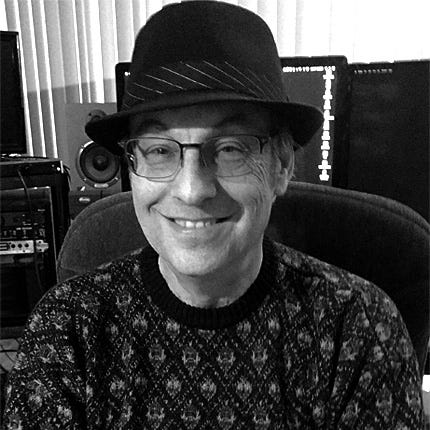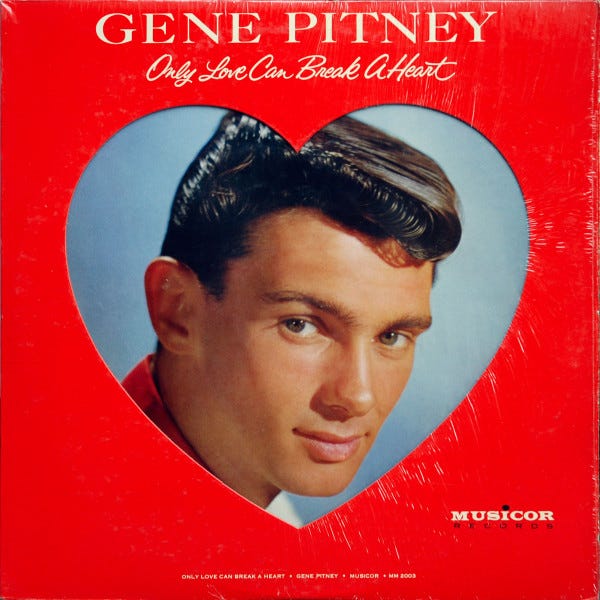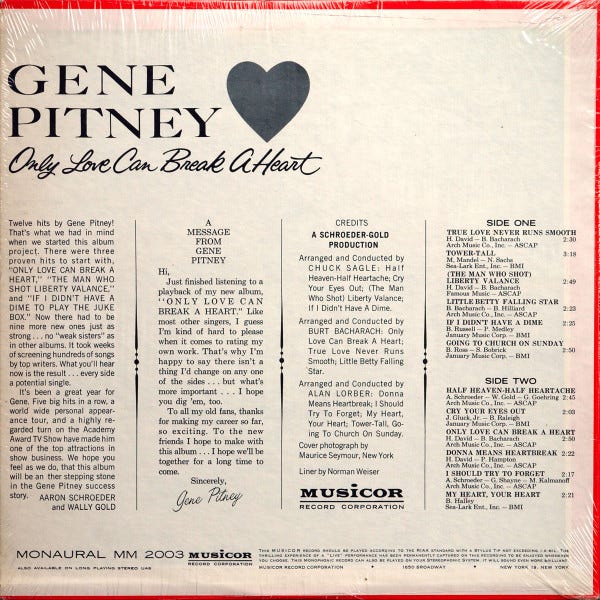Burt, Hal & Me: Songwriter Jay Asher on the Inspirational Magic of Burt Bacharach and Hal David
The Beatles and their British Invasion counterparts inspired millions to pick up guitars and form bands. The '60s had other talented artists who, in turn, inspired songwriters, including this one.

Jay has written songs that have been recorded by internationally-known recording artists Julio Iglesias, Whitney Houston, Stephanie Mills, and Donna Summer, among others.
He was raised in the Boston area and is a graduate of the Boston Conservatory of Music with a degree in Music Composition.
As a composer, he has written music scores and songs for TV series, Movies of the Week, and films, including New World Television’s Zorro, NBC’s Fame, and the NBC Movie Of The Week, “Fugitive Nights,” as well as scoring DVD documentaries.
I started singing around the age of 5, studying piano at 8, and wrote my first song in 1961, at 13. There was never a question in anyone’s mind as to what I was going to do with my life. My first musical heroes were people like Bobby Darin, Neil Sedaka, Jimmie Rodgers, and others, but in 1962, I began listening to Gene Pitney and fell in love with his voice.
He had had big hits with “Town Without Pity” (written by Dimitri Tiomkin and Ned Washington, #13 on Billboard Hot 100), “The Man Who Shot Liberty Valance” (Burt Bacharach and Hal David, #4, Hot 100), and “Only Love Can Break A Heart” (Bacharach, David, #2).
I bought an LP of his entitled, “Only Love Can Break A Heart,” and when I looked at the credits, I discovered that most of the songs I loved were written by a songwriting team: music by Burt Bacharach, and lyrics by Hal David.


There was no Google to search the internet about them then, but there were magazines, sheet music and record stores, and I started to find out what other songs they had written, and I discovered that songs I loved by Bobby Vinton, Jackie DeShannon, Gene McDaniels, even Perry Como (for cryin’ out loud) were written by Burt and Hal. And both had written songs with others that I loved.

And then there were all those great Dionne Warwick songs. I was now obsessed with their songs. In 1964, The Beatles hit America and ushered in the British Invasion, and as a performer, I mostly played in rock bands doing the songs of those groups and similar-sounding American groups.
But as a listener, I still was following Burt and Hal, and beginning to write songs that were clearly influenced by them. While I was studying Classical music at the Boston Conservatory Of Music, composing avant garde style music, singing in the chorus, listening to jazz at nearby Berklee School Of Music, almost alone among my classmates, I was also marveling at the incredible quality of Sergio Mendez and Brasil ‘66 recording of “The Look Of Love”, Herb Alpert’s “This Guy’s In Love With You”, and the Carpenters’ “(They Long to Be) Close To You”, just to name a few.
When I graduated Boston Conservatory, my goals were fixed: I wanted to become a combination of Burt, Hal, Randy Newman, and others so that I could write hit songs, have hit records as a singer, AND score films, like Burt was doing and Randy would go on to do.
When I was offered a gig in Los Angeles to accompany a singer, Brandi Perry, I took it. I met her at the Boston Playboy Club, where I was performing with my group in the lounge. She was headlining in the main room, and had already incorporated a couple of my songs in her act, after I played them for her and did charts.
I wanted to hit the ground running: Her sheet music said that Burt’s publisher was called Blue Seas Music, and that it was administered by Fred Ahlert Music in Beverly Hills. Fred was a songwriter who was famous for having written “I’ll Get By (As Long as I Have You),” originally published in 1928, and recorded by many, including Billie Holiday, The Platters, Frankie Laine, and Jack Jones, in 1965:
I called and made an appointment with a young song runner there named Don Sorkin. I made a demo tape of me playing and singing my songs, recorded gratis by Michael Smith, a musician friend I had already made who had time at a recording studio. He was wildly enthusiastic about me and my songs, which was gratifying.
At the appointment I played the songs for Don, and his comment was that my songs were close to being hit songs, but not quite there. (He was right, by the way). Notwithstanding, he tried to help me get them to people and network. I became friendly with a TV and film composer named David Michael Frank, and he was friends with Hal’s son, Jim David. Jimmy was running Hal’s publishing in L.A. I called and set up an appointment with him.
I played some songs for Jim, and he said, “I like these a lot and I want to sign you to an Exclusive Writer agreement, but before I play them for my father, we have to work on them to get them better, because he is very picky about lyrics.” Of course, he was! :)
For two months, I worked with Jim on the songs, and he definitely helped make them better. He was flying out to New York to see his dad about signing me and one other writer and would call me when he returned. But it was a done deal.
I was over the moon! I was going to get a modest weekly advance to write songs for Hal David’s publishing company! I was finally on my way to my dreams.
And then Hal broke my heart.
Jim returned and I received no phone call. I had already reached the conclusion that in this business, no news was rarely good news, so I called and left messages and finally he called me in for a meeting.
He told me that Hal, who could apparently be tight with his wallet, had only agreed to let Jim sign one writer, and Hal preferred the other writer’s songs, so no deal. As far as I know, that writer did not go on to have any notable success, so there :)
Over time, my songwriting style evolved and became less overtly like Burt and Hal and I got songs signed, wrote with great songwriters including two Academy Award winners, had songs recorded by name artists, scored some films and TV shows including New World’s Zorro, and have always made part of my living singing and playing songs, and Burt and Hal’s songs were always part of my sets when performing.
Coda
I met Burt a couple of times and had the opportunity to briefly tell him how much his music meant to me. I wish I could say that led to a deeper discussion and friendship, but it didn’t. And sadly, I never met Hal, who passed away in 2012, and we lost Burt in 2023.
In the last few years, I have produced some Burt Bacharach-Hal David tribute shows featuring myself and other performers, and Hal’s widow, Eunice David (pictured above), attended one and we have become friendly, which is an honor.
One final thought I would like to share with you: A lot of times you will see the songs referred to “Bacharach songs.” This actually offends me, because it ignores Hal’s equally important contribution to the songs.
Burt wrote ”G-F-E-F-G, F-C.” Hal wrote, “What’s it all about, Alfie.”
There are reasons for this, I know. Burt was handsome, married to a movie star, performed live with orchestra, and liked the spotlight. Hal was none of that. In the studio, Hal had an equal voice with Burt when they were producing records and again, without his wonderful lyrics, the songs would not have become what they are.
Both Burt and Hal went on to write successful songs with others, some quite good, but in my mind at least, lesser.
So which songs are my favorites? Too many to choose, but “Alfie” is not only my very favorite of theirs, it’s possibly my favorite song of all. And even now, many times other songwriters tell me they can hear the influence of Burt and Hal in my songs.
So I continue to celebrate and perform the songs of Burt Bacharach and Hal David because, along with The Beatles songs, they have been the soundtrack of my musical life.





That was a fun read. Seems like an interesting guy. Favorite line: Burt wrote ”G-F-E-F-G, F-C.” Hal wrote, “What’s it all about, Alfie.”
Perfect pull quote!
I enjoyed this, Brad. I was Burt’s trumpet guy for the last 20 some years of his career and heard Burt speak of him many times. I think we played some of their collaborations in concert.